Text
my granddad just called me to tell me how big his cauliflowers are growing and it was so cute theyre “TWICE as big as the ones you get in the shop”
2M notes
·
View notes
Photo
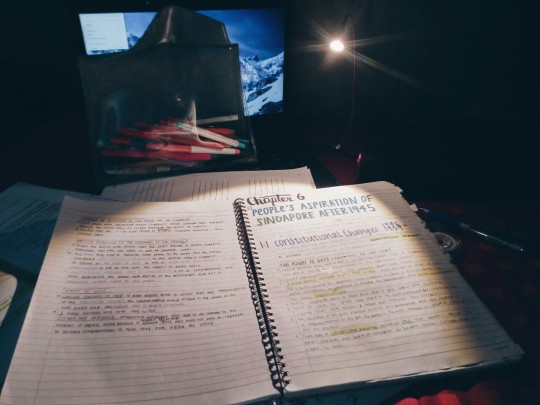
23 july'16 || 4/100 days of productivity ⛄ :
Studying hitstory in bed (feeling a little weezy) about to doze off soon 💤💤
On the 4th eps of キズナイ一バ一
Гkiznaiver and well i love it (if u like keikaisensen and bsd , you will love kiznaiver too :)
6 notes
·
View notes
Photo
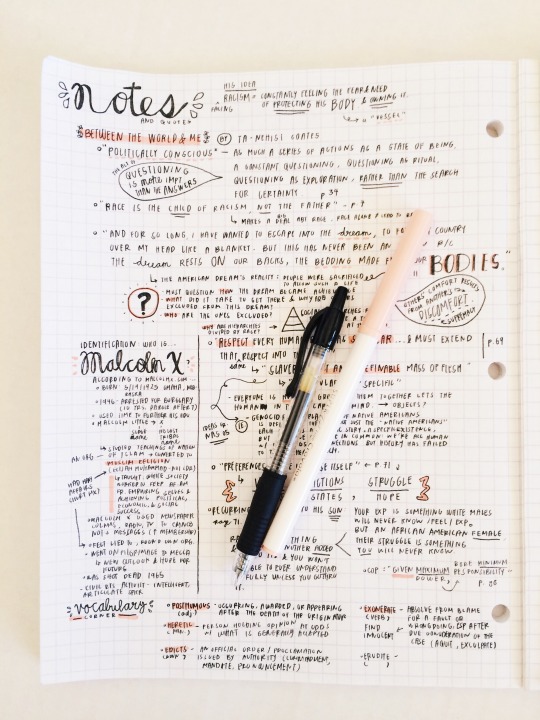
07.23.16 | currently reading: Between the World and Me by Ta-Nehisi Coates
4K notes
·
View notes
Photo
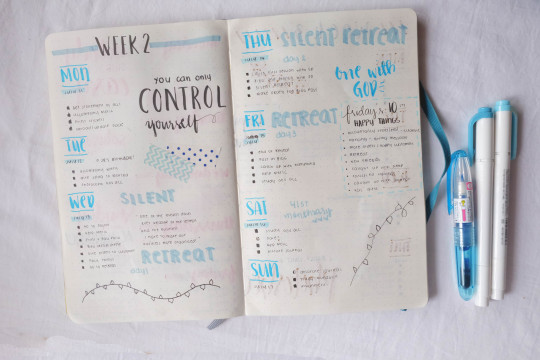
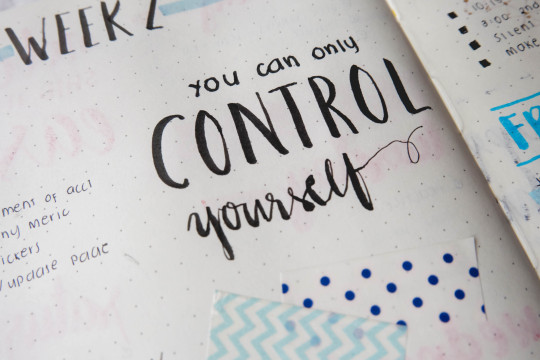

7.30.16// it’s like less than two days til august and i’m just uploading my second spread for julyy. i’ve been busy with exams but i’m finally freee!! btw this is me starting a minimalist spread.. i think it looks cleaner than before??? hmm. no photos for now. will try a better one for august.*cross fingerss** i’ll upload the next two spreads sooner than everrr. on one note, i’m starting a photography blog!! catch it soon. hihi
903 notes
·
View notes
Conversation
me at home: oh my god i lvoe history im G Onna STICK T H E ENTIRE TREATY OF VERSAILLES UP MY ASS
me when i get history homework: please delete history
99K notes
·
View notes
Note
Do you have some tips on how to study for an exame in 5 dais?
We’ve all been there! Here are some things I do to study for an upcoming exam-
1. Unless you’re using an online notetaker, listening to a study playlist, or doing anything else necessary for you to study, put all of your devices far, faarrrr away!!! (I know its hard. Just do it. It’ll help, I promise.)
2. After reading your class notes, rewrite them! This is where you can “personalize” the notes you’ve copied down from your teachers; I always try to rewrite my notes as straightforward as I can, rewriting the information into my own “language” that my brain can more easily understand. Again, highlight and underline specific info OR info that is hard for you to remember. It even helps to draw out examples to help you understand the information.
3. If you have vocabulary to study, make notecards! Notecards are a great way to study vocab. If you’re not so fond of making physical index card notecards, quizlet is one of my favorite ways to study. Not only can you make notecards and share them with your friends/classmates, you can also play games to help you memorize your vocab!
4. A familiar assignment I’ll get from my teachers is to create your own test and swap it with a friend’s! This is a great way to study for a test because it allows you to think of essential questions and find their answers. A great way to make up questions is by reading chapters from your textbook. Make your test as long or short as you would prefer; I usually prefer creating multiple choice tests, just make sure you create an answer key! If you prefer an app or a website instead of physically writing out your test, use Kahoot and play with your friends!
5. Grab a snack. Drink some water. Give your eyes and brain a break. Sleep. On. Time. These are all essential parts of studying for an exam. If you claim that you “don’t have time” for these things, make time. Grades are important, but your health is more important.
I hope you find these tips helpful and good luck on your exam!
24 notes
·
View notes
Photo

Desk situation before the study session.
4K notes
·
View notes
Photo
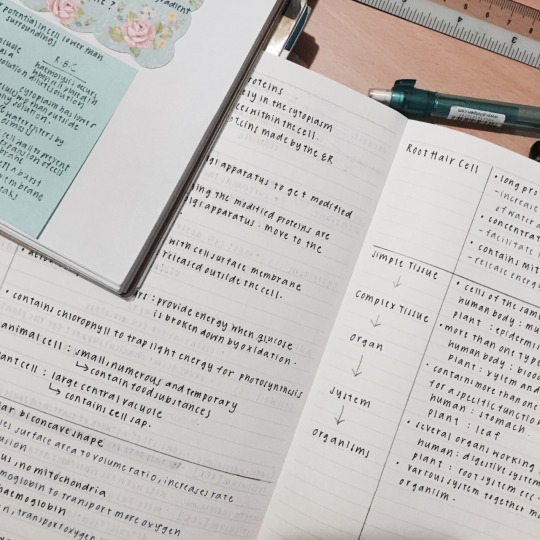
There’s a sale at Muji and I took the chance to buy their notebooks and so far I’m really enjoying it!!! Also tried out another way of note taking for my bio notes and I think I will start sticking to this method
4K notes
·
View notes
Text
101 self care ideas for when it all gets too much
1. Have a good, long, body-shaking cry.
2. Call a trusted friend or family member and talk it out.
3. Call in sick. Take comp time if you can. Take a mental health day.
4. Say no to extra obligations, chores, or anything that pulls on your precious self-care time.
5. Book a session (or more!) with your therapist.
6. Dial down your expectations of yourself at this time. When you’re going through life’s tough times, I invite you to soften your expectations of yourself and others.
7. Tuck yourself into bed early with a good book and clean sheets.
8. Watch a comforting/silly/funny/lighthearted TV show or movie.
9. Reread your favorite picture and chapter books from childhood.
10. Ask for some love and tenderness from your friends on social media. Let them comment on your post and remind you that you’re loved.
11. Look at some some really gorgeous pieces of art.
12. Watch Youtube videos of Ellen DeGeneres and the adorable kids she has on her show.
13. Look at faith-in-humanity-restoring lists from Buzzfeed.
14. Ask for help. From whoever you need it – your boss, your doctor, your partner, your therapist, your mom. Let people know you need some help.
15. Wrap yourself up in a cozy fleece blanket and sip a cup of hot tea.
16. Breathe. Deeply. Slowly. Four counts in. Six counts out.
17. Hydrate. Have you had enough water today?
18. Eat. Have you eaten something healthy and nourishing today?
19. Sleep. Have you slept 7-9 hours? Is it time for some rest?
20. Shower. Then dry your hair and put on clothes that make you feel good.
21. Go outside and be in the sunshine.
22. Move your body gently in ways that feel good. Maybe aim for 30 minutes. Or 10 if 30 feels like too much.
23. Read a story (or stories) of people who overcame adversity or maybe dealt with mental illness, too. (I personally admire JK Rowling’s story.)
24. Go to a 12-Step meeting. Or any group meeting where support is offered. Check out church listings, hospital listings, school listings for examples.
25. If you suspect something may be physiologically off with you, go see your doctor and/or psychiatrist and talk to them. Medication might help you at this time and they can assist you in assessing this.
26. Take a long, hot bath, light a candle and pamper yourself.
27. Read these inspirational quotes.
28. Cuddle someone or something. Your partner. A pillow. Your friend’s dog.
29. Read past emails/postcards/letters etc. from friends and family reminding you of happier times.
30. Knit. Sculpt. Bake. Engage your hands.
31. Exhaust yourself physically – running, yoga, swimming, whatever helps you feel fatigued.
32. Write it out. Free form in a journal or a Google doc. Get it all out and vent.
33. Create a plan if you’re feeling overwhelmed. List out what you need to do next to tackle and address whatever you’re facing. Chunk it down into manageable and understandable pieces.
34. Remember: You only have to get through the next five minutes. Then the next five. And so on.
35. Take five minutes to meditate.
36. Write out a list of 25 Reasons Why You’ll Be OK.
37. Write out a list of 25 Examples of Things You’ve Overcome or Accomplished.
38. Write out a list of 25 Reasons Why You’re a Good, Lovable Person.
39. Write out a list of 25 Things That Make Your Life Beautiful.
40. Sniff some scents that bring you joy or remind you of happier times.
41. Ask for support from friends and family via text if voice-to-voice contact feels like too much. Ask them to check in with you via text daily/weekly. Whatever you need.
42. Lay down on the ground. Let the earth/floor hold you. You don’t have to hold it all on your own.
43. Clean up a corner of a room of your house. Sometimes tidying up can help calm our minds.
44. Ask yourself: What’s my next most immediate priority? Do that. Then ask the question again.
45. Read some poetry. Rumi, Hafiz, Mary Oliver are all excellent.
46. Take a tech break. Delete or deactivate social media if it feels too triggering right now.
47. Or maybe get on tech. If you’ve been isolating maybe even interacting with friends and family online might feel good.
48. Go out in public and be around others. You don’t have to engage. But maybe go sit in a coffee shop or on a bench at a museum and soak up the humanity around you.
49. Or if you’re feeling too saturated with contact, go home. Cancel plans and tend to the introverted parts of yourself.
50. Ask friends and family to remind you that things will be OK and that what you’re feeling is temporary.
51. Put up some Christmas lights in your bedroom. They often make things more magical.
52. Spend a little money and treat yourself to some self-care and comfort. Maybe take a taxi versus the bus. Buy your lunch instead of forcing yourself to pack it. Buy some flowers that delight you.
53. Make art. Scribble with crayons. Splash some watercolors. Paint a rock. Whatever. Just create something.
54. Go wander around outside in your neighborhood and take a look at all the lovely houses and the way people decorate their gardens. Delight in the diversity of design.
55. Go visit or volunteer at your local animal rescue. Pet some animals.
56. Look at photos of people you love. Set them as the wallpaper of your phone or laptop.
57. Create and listen to a playlist of songs that remind you of happier times.
58. Read some spiritual literature.
59. Scream, pound pillows, tear up paper, shake your body to move the energy out.
60. Eat your favorite, most comforting foods.
61. Watch old Mr. Rogers’ Neighborhood videos online.
62. Turn off the lights, sit down, stare into space and do absolutely nothing.
63. Pick one or two things that feel like progress and do them. Make your bed. Put away the dishes. Return an email.
64. Go to a church or spiritual community service. Sit among others and absorb any guidance or grace that feels good to you.
65. Allow yourself to fantasize about what you’re hoping or longing for. There are clues and energy in your reveries and daydreams that are worth paying attention to.
66. Watch Autonomous Sensory Meridian Response videos to help you calm down and fall asleep at night.
67. Listen to monks chanting, singing Tibetan bowls or nature sounds to help soothe you.
68. Color in some adult coloring books.
69. Revisit an old hobby. Even if it feels a little forced, try your hand at things you used to enjoy and see what comes up for you.
70. Go to the ocean. Soak up the negative ions.
71. Go to the mountains. Absorb the strength and security of them.
72. Go to the forest. Drink in the shelter, life and sacredness of the trees.
73. Put down the personal help books and pick up some good old fashioned fiction.
74. Remember: Your only job right now is to put one foot in front of the other.
75. Allow and feel and express your feelings – all of them! – safely and appropriately.Seek out help if you need support in this.
76. Listen to sad songs or watch sad movies if you need a good cry.
77. Dance around wildly to your favorite, most cheesy songs from your high school years.
78. Put your hands in dirt. If you have a garden, go garden. If you have some indoor plants, tend to them. If you don’t have plants or a garden, go outside. Go to a local nursery and touch and smell all the gorgeous plants.
79. If you want to stay in bed all day watching Netflix, do it. Indulge.
80. Watch or listen to some comedy shows or goofy podcasts.
81. Look for and Google up examples of people who have gone through and made it through what you’re currently facing. Seek out models of inspiration.
82. Get expert help with whatever you need. Whether that’s through therapy, psychiatry, a lawyer, clergy, let those trained to support you do it.
83. Educate yourself about what you’re going through. Learn about what you’re facing, what you can expect to feel, and how you can support yourself in this place.
84. Establish a routine and stick to it. Routines can bring so much comfort and grounding in times of life that feel chaotic or out of control.
85. Do some hardcore nesting and make your home or bedroom as cozy and beautiful and comforting as possible.
86. Get up early and watch a sunrise.
87. Go outside and set up a chair and watch the sunset.
88. Make your own list of self-soothing activities that engage all five of your senses.
89. Develop a supportive morning ritual for yourself.
90. Develop a relaxing evening ritual for yourself.
91. Join a support group for people who are going through what you’re going through. Check out the listings at local hospitals, libraries, churches, and universities to see what’s out there.
92. Volunteer at a local shelter or hospital or nursing home. Practice being of service to others who may also be going through a tough time.
93. Accompany a friend or family member to something. Even if it’s just keeping them company while they run errands, sometimes this kind of contact can feel like good self-care.
94. Take your dog for a walk. Or borrow a friend’s dog and take them for a walk.
95. Challenge your negative thinking.
96. Practice grounding, relaxation techniques.
97. Do something spontaneous. Walk or drive a different way to work. Order something new off the menu.Listen to a Spotify playlist of new songs.
98. Work with your doctor, naturopath or nutritionist to develop a physical exercise plan and food plan that will be supportive to whatever you’re facing right now.
99. Pray. Meditate. Write a letter to God/The Universe/Source/Your Higher Self, whatever you believe in.
100. As much as you can, please try and trust the process.
101. Finally, please remember, what you’re going through right now is temporary. It may not feel like that from inside the tough time you’re in, but this too shall pass and you will feel different again someday. If you can’t have faith in that, let me hold the hope for you
37K notes
·
View notes
Photo
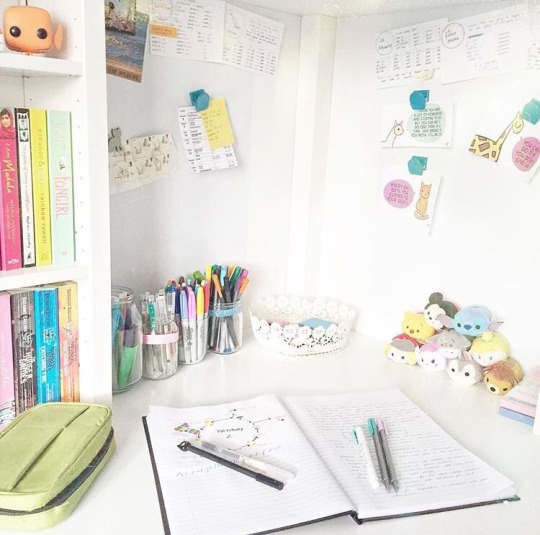
|11.4| busy busy with Irish oral this week & French the next
from my instagram: elkstudies
4K notes
·
View notes
Photo
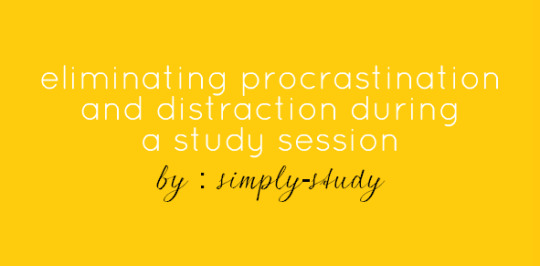
during my homework/study/revision sessions, i often find myself wasting precious time making frivolous decisions and adjustments i should have already figured out. i thought of a couple ways to avoid such procrastination and distraction, and to make the most of your study sessions!
1. COLLECT EVERYTHING YOU NEED BEFORE YOU START.
even if you think you MIGHT need it, grab it. when you need something in the middle of doing homework, studying, or revising, it might cause you lose focus and track.
now, mind you, this one isn’t a super huge problem if you simply get what you need and go back to your study space (or don’t leave it in the first place), but just in case, get everything you need so you’re not tempted to wander, go check your phone, etc.
2. HAVE A COLOR CODE / SCHEME.
i can’t tell you how many times i’ve been sitting down to make notes, a study guide, or something similar, and i end up going through my stationery collection and staring at my paper for 10 minutes trying to decide which colors to use.
establish a color code for the subject you’re taking notes on, and/or already have the colors you want to decorate/write your notes in chosen.
3. MAKE A STUDY PLAYLIST.
it will eliminate the need to go on your phone/computer/ipod/etc. to change the song, which can lead to you using it for social media and other things.
put songs you LOVE on there so it’s constant jamming—not constant distraction!
4. CREATE SPECIFIC, DETAILED TASKS TO COMPLETE / GOALS TO MEET.
this is a huge one for me—probably my biggest issue. i find myself at the end of the study session with barely anything accomplished because i don’t have a game plan in the first place.
chunk your assignment or topic of study/revision into small, manageable chunks so you’ll not only feel more productive, you’ll BE more productive.
you’ll have a clear list of everything you need to get done by the end of your session, motivating you to work and steering you along the way so you don’t end up idling the whole time.
5. KNOW THE NOTE-TAKING METHOD / STUDY STRATEGY YOU’LL BE USING.
if you’re taking notes from a textbook, video, test prep book, novel, etc., decide on a note-taking method before you even start. this will keep you from being dissatisfied with your notes and starting over, scrolling through tumblr/social media for inspiration then straying away from actual work, getting overwhelmed because you don’t know what to do, and (obviously) getting no notes taken.
as for studying/revising, choose whether you’ll be using flashcards, summary foldables, re-reading, highlighting, etc. to study or revise the information before you start. this prevents spending time trying to figure out HOW you’re going to study/revise INSTEAD OF studying/revising, and helps you actually get some learning done.
6. TRY SETTING A TIME LIMIT
some people work well under pressure! the time constraint might motivate you to get as much done as possible in the time you’ve allotted yourself, thus decreasing your will to turn your attention to other things.
moral of this post: plan out your study sessions so you’re fully prepared for success, productivity, and accomplishment! :)
+ more of my posts +
how to (effectively) use highlighters
(ap) biology note-taking
what is revising? revision explained + methods and tips
tips for bouncing back after a long break
ap euro (or any history) note taking tips
how to slay the new semester
how to focus : tips on improving your focus
ap euro masterpost (again)
ap euro crunch time
my study routine
what i learned from ap euro
my original posts tag
connect with me!!!
instagram @simply.study
snapchat @simply-study
2K notes
·
View notes
Text
How to Write a University-level Essay
Heyo, so school is fast approaching, and seeing as Tumblr is made up of a lot of younger users who will soon be shipping off to college or university soon, I thought I would take it upon myself to help spread my knowledge of essay-writing. Essay-writing is my thing. I love it. I live for it. It’s how I make up for my shitty test marks, and still get by with an 85 average+ in University classes. I’m a historian by trade, so perhaps this information will seem a bit off from what you’re used to, but hopefully, It’ll help you out. If you have any questions, feel free to shoot me an ask.
1. Consider your question and find your thesis.
I know, I know. People always say, no! Never start with your thesis/intro paragraph! Go to the body!! Well i’m here to say forget everything you’ve been told. Forget that, forget the stupid hamburger shit they teach you, forget it all and start reading.
I ALWAYS start with my thesis. Why? Because you cannot make good paragraphs without knowing what you’re researching. You need direction, and a thesis is your map.
So, the question we’ll use shall be: What is one way in which the Union won the American Civil War?
Now remember, your thesis is your map. It shows you where to go, what to look for. The thesis is the heart and soul of all your work. You want a good, solid thesis. What does that include, you ask?
An idea
A reason for said idea
Evidence to support said reason, and thus validate the idea.
So, lets do an example. Let’s say I’m writing on the use of media during the American Civil War. I like photography, and wrote a paper on this in my second year, but im gonna be doing this example freehand(idk where I put that essay lol) so lets work with how I got an A+ on that paper. This will be my idea:
“Photography during the American Civil War influenced the war’s outcome in the Norths favour.”
This is VERY vague. This is an example of a thesis in bloom! Let’s take it further. Look at the above. What questions would you have from this thesis?
-Who was taking photos at that time?
-Why did it influence the outcome?
-How did it influence the outcome?
-Who consumed photography as a media at that time?
This is where you STOP, and start the next step.
2. Research
Start your basic research with your idea, and the above questions in mind. Look at libraries, ask your professor or TA or librarian, or just do some basic google searches to get to know the subject(but for the love of god if you include a google link in your citation I will personally hunt you down and castrate you.)
I like to start with the basics of any inquiry: WHO, WHAT, WHERE, WHEN, WHY, HOW. Who was taking photos? Where were they displayed that caused influence? ect…These, in relation to your beginner thesis, will help guide you in what form your thesis will take.
Once you’ve finished that, and have a general feel for the time period, go back to your thesis.
3. THESIS 2.0
Go back to your original question: What is one way in which the Union won the American Civil War? Now look at your thesis again. It’s too vague, isn’t it?
As you can see, our original thesis was too vague to be a real thesis. So, we NARROW IT DOWN using our WWWWWH progress we focused on during early research!
“Photography during the American Civil war influenced the war’s outcome by providing a visual for ordinary citizens about the horrors of war, and thus helping to increase donations and awareness to the cause.”
Great! But once again, too vague! Questions that may arise include:
Who was taking the photos
Evidence for donations?
Evidence for social awareness?
So, we NARROW IT DOWN again. I’m going to use Andrew Gardner’s photography during the Civil war, as he was one of the most famous and influential at the time.
“Andrew Gardner’s photography during the American Civil war influenced the war’s outcome by providing a visual for ordinary citizens about the horrors of war, and thus helping to increase donations and enlistment in the Union through awareness to the cause…”
The above then gives us the following(why and how are sometimes grouped together):
Who: Andrew Gardner
What: Photography helped the north win the war.
Where: Union-aka northern states
When: American Civil War
Why/How: Because Andrew Gardner’s photography raised social awareness through this new and budding medium
Use this sort of outline to guide you in the next step!
4. Now that we have a thesis, you need to do some more research and evidence gathering.
The way I like to do this is to go check out a few books from the library(look for text books in particular), and leaf through the index for matching terms. Our matching terms would be:
Photography, civil war, Andrew Gardner, media
From there, you read over the pages, and see if any of the info relates to your subjects. Copy down quotes, page numbers, book title, author, publishing date and publisher. You need these for your bibliography. Pick and choose relevant information. The filter for relevant information relies entirely on your thesis, because it decides what you need to be looking for—this is why I hate when people tell me to start writing paragraphs before I write a thesis! It’s simply impossible and counter productive, and will cost you hours in revision.
So, gather your information from the library, and cross-reference with peer-reviewed articles and data. For our thesis, we would need data on enlistment numbers in an area after a date of Andrew Gardner’s photography exhibit showcases. No matter what type of essay you’re writing, you can always back up your evidence with data, and it won’t hurt one bit. Don’t be afraid of the numbers, kids!
So, if we were to go back to our thesis, we could now expand on it like this:
“Andrew Gardner’s photography during the American Civil war influenced the war’s outcome by providing a visual for ordinary citizens about the horrors of war, and thus helping to increase donations and enlistment in the Union through awareness to the cause. An increase in donations and enlistment in relation to exposure to Gardners work is seen in data/evidence point A, as well as in data/evidence point B, which will be fully outlined in the points below.”
This gives you an example of how to lead from a thesis, to your opening paragraph.
5. Data and Evidence Justifications–Paragraph making
This is the section where you can branch your essay into your data and evidence points you gathered in steps 2 and 4. You can have as many paragraphs as you like, just make sure your evidence and data is strong and supported. I personally like to work with my thesis copied and pasted onto the top of every page I write on. This keeps you on track, with your clear goal in mind, and will help you from straying. I will give you an example of how a paragraph might sound.
Andrew Gardner’s photography during the American Civil War became heavily influential upon the American population at the time, particularly the north, wherein which his work was showcased. The influence of Gardner’s photographic works is seen in the _____, which shows us that without the influence of Gardner’s media influence, war efforts and awareness may not have been as successful as they had been.
This is an alright opener for you to work with. The ___ is where you could put in your data point or evidence piece. The point of the paragraph is to show your support for your thesis by confirming it with evidence.
Your paragraphs should take this form:
Present, Confirm, Conclude, Lead.
You present your evidence, confirm its relation to the thesis and confirm the validity of the thesis, conclude by brief revision of evidence, and then lead into your next paragraph.
6. Conclusion
Your conclusionary paragraph should be a look-over of the above paragraphs. Restate your thesis, present a summarized version of your paragraphs(one or two sentences only), and perhaps take the time to look at your own views on the subject. An example might look like this:
“Taking a moment to step away from the above mentioned evidence, I believe it to be scholarly acceptable and even necessary to state my own views on the subject presented. In drawing conclusions, I felt that the above information was correct in that it presented a reality of the time period, in which photography was becoming a medium to be embraced by popular society. People were not only astounded by Gardner’s photographs on a social level, but also a technical level. The astonishment people held at seeing the war-torn battle fields spurred them into action, and even today can still present feelings of dread, fear and loss when looking at his photos…blah blah blah”
Why is it scholarly acceptable and perhaps necessary to state your views? Oftentimes, it is to reassure the reader of your own personal bias’, which exist whether you like them or not, to the subject at hand. Having a small tidbit on your own thoughts about your research ect, breaking away from the third-person droning of an essay can be refreshing and welcoming for a prof at the end of his stack of essay reading.
7. In summary
Thesis
WWWWWH
NARROW IT DOWN
Data and Evidence
Present, Confirm, Conclude, Lead
Self opinions/Conclude
All in all, do unique things. Professors love it when they come across something that’s not cookie cutter! Even if they present you with a list of essay topics, take the leap and ask them if you can do your own research topic!! Take risks with your essay writing, talk to your professors about what you want to do, and try to have fun with your research. I’ve written on everything from civil war photography to Disney princesses in american media, to the religious formation of idea of heaven and earth. Remember, so long as there’s credible, documented evidence, it’s possible to write about it.
56K notes
·
View notes
Photo
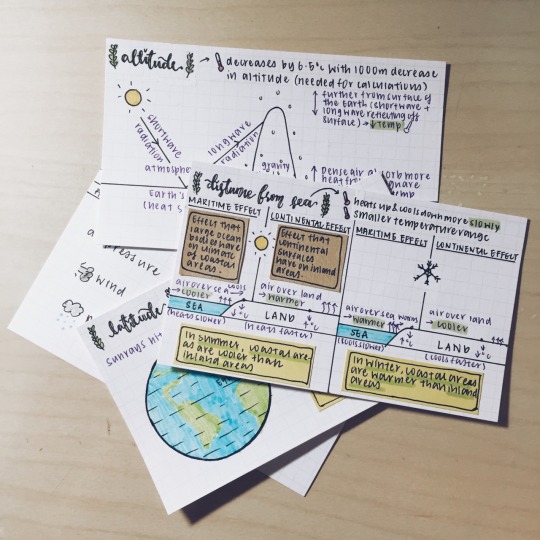
reviewing some old geography notes! 🌍
I got shortlisted for the EAE interview! all the best to the other applicants! 🙌🏽🍀
5K notes
·
View notes
Photo

Revision in Costa, again.
5 days to go.
5K notes
·
View notes
Photo

wednesday july 27, 22:47
Today I’ve actually been quite productive, but I haven’t changed much; once again I forgot to take a photo while I was actually working! I watched some anatomy & physiology lectures, took some notes on that, organised my desk a little bit more, picked up a package at the post office and cleaned + organised files on my computer! It really was time for that last one, haha. Well, anyway, that’s when I found this photo that I never posted, so since I don’t have a photo from today, I thought I’d just post this instead!
Hope everybody is having a great day, and I promise, I will try getting better at posting photos and such! :)
455 notes
·
View notes
Photo
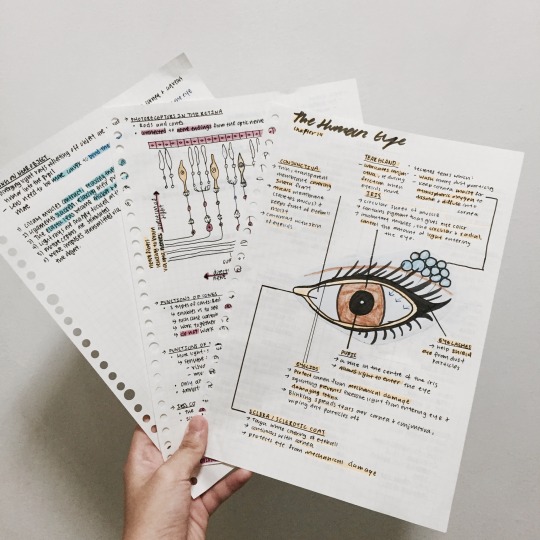
14/2/16: I spent valentines day working on some annotation for Lord of the Flies (because prose over hoes) and my biology notes for the chapter on the human eye! I also had my first chemistry (more like chemisery) tuition lesson and that was really eye opening– pun unintended– and signed up for my school’s internal model United Nations. I guess you could call this a day of firsts ( ゚▽゚)/
5K notes
·
View notes
